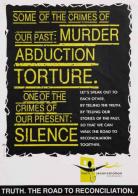"...at that stage the politicization was so advanced in the Eastern Cape that when action was taken against any of these leading figures the community came forward and demanded that they be released and if this was not done there would be unrest or the unrest would be expanded.... Port Elizabeth was ungovernable... Pebco was in control..."
- HB du Plessis, TRC Amnesty Committee testimony, AL2878_A2.2.15.40, Freedom of Information Programme (FOIP) Collection, South African History Archive
On May 8, 1985, three members of the Port Elizabeth Black Civic Organisation (Pebco) left their homes in the Kwazakhele Township near Port Elizabeth. The three men were local leaders of Pebco - including the president, Qaqawuli Godolozi, the secretary, Champion Galela and executive Committee member, Sipho Hashe. Pebco's strength in the Eastern Cape was considered to be a serious threat by the Apartheid regime. With the community behind them, Pebco was able to leverage the government and security apparatus to negotiate with them.
The Apartheid regime could not sustain this threat, and a decision had been taken to eliminate Pebco's leadership. The assassinations had been motivated by allegations of Pebco's involvement with the African National Congress (ANC) in exile in organising strikes, consumer boycotts and stayaways. So the men were lured by security police to the Port Elizabeth airport, disguised as benign ‘Embassy officials' offering donations. The gruesome details of what happened next would remain a mystery for over one decade: when their disappearance was questioned, security police claimed that the men had probably gone into exile.
In 1996, the story of the Pebco Three resurfaced in the public arena through the Truth and Reconciliation Commission (TRC). Godolozi, Galela and Hashe, like the Cosas Two (Topsy Madaka and Simphiwo Mthimkhulu) murdered in 1982, were taken by members of the Vlakplaas security police unit to an abandoned police station on a farm at Post Chalmers, near Cradock. Here, they were interrogated, tortured and murdered. Their bodies were burnt and their remains thrown into the Fish River.
Aside from the harrowing testimonies given by the widows, who were later referred to the TRC's Reparation and Rehabilitation Committee, former Vlakplaas operative Joe Mamasela gave details of the abduction and murder of their husbands. His testimony was screened on the TRC Special Report, a weekly TV show that followed the TRC between 1996 and 1998. During his 1997 amnesty hearing, former security policeman Gideon Nieuwoudt confessed to his participation in the abduction and murder of the Pebco Three. His admission was soon followed by other Vlakplaas hit squad operatives - all of them were denied amnesty by the TRC. Each man faced charges on three counts of murder and three counts of assault to do grievous bodily harm.
A dignified burial
In 2009, the remains of the missing men were returned to their families for burial in a four hour service at Nelson Mandela Metropolitan University Missionvale Campus. The remains had been verified through the information emerging through by the TRC, as well as forensic investigations conducted by the Missing Person Task Team (MPTT) of the National Prosecuting Authority (NPA). The remains had been uncovered in 2007, and once the investigations were complete, the decision was made to bury them in a dignified manner.
SAHA projects, products and collections related to the TRC
Special Report Multimedia Package
SAHA is currently finalising a multimedia product containing a complete set of the 78 Special Report television programmes on South Africa's Truth and Reconciliation Commission (TRC). The product is will be distributed free of charge to tertiary educational establishments, as well as institutions working in the field of transitional justice and reconciliation, particularly those working with victim/survivor groups.
Learn more about the Special Report Multimedia Package
The TRC archival project
Conducted from 2003 - 2006, this joint archival initiative by SAHA and Historical Papers at the University of the Witwatersrand, funded by The Atlantic Philanthropies, aimed at identifying, preserving and promoting public access to the TRC archive, and producing:
- A Guide To Archival Sources Relating To The South African Truth And Reconciliation Commission identifying where in South Africa various TRC collections are located, and describing these collections;
- A Select Bibliography To The South African Truth And Reconciliation Commission identifying key published articles, books and book chapters, theses, online and audiovisual resources about the TRC, from conception to aftermath;
- The TRC Oral History Project (AL2985), featuring interviews with 63 individuals who worked for the Commission in various capacities and in different locales;
- The TRACES OF TRUTH website, featuring digitised copies of key archival materials relating to the TRC housed at SAHA and Historical Papers. These materials are organised into five broad categories - background, human rights violations, amnesty, reparations, and aftermath, with accompanying narrative, in an attempt to contextualise, compare and contrast these archival fragments.
- The addition of new collections relating to the TRC to both SAHA and Historical Papers' archives







